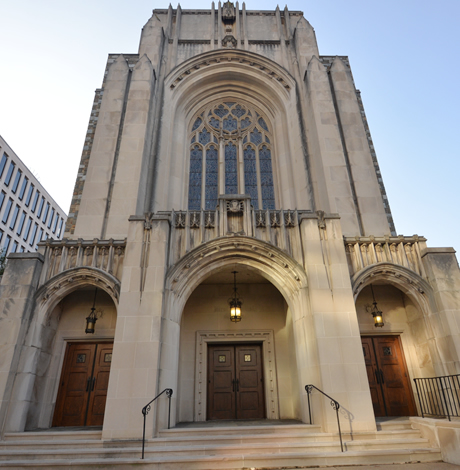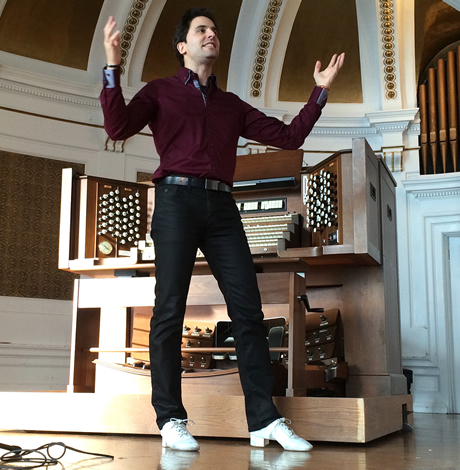Music & Concerts
Ramirez balances taste, restraint with solid technique at First Baptist recital
Eclectic program gave Barcelona native ample opportunity to pursue wide sonic range on church’s five-manual Austin
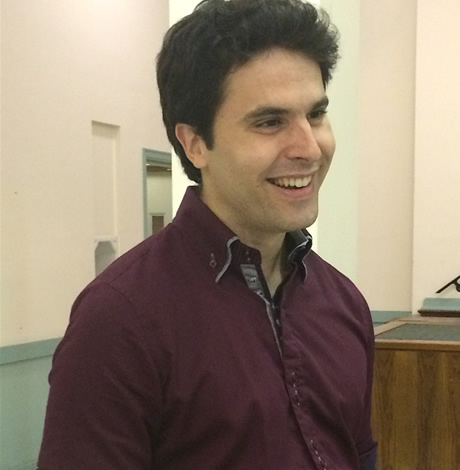
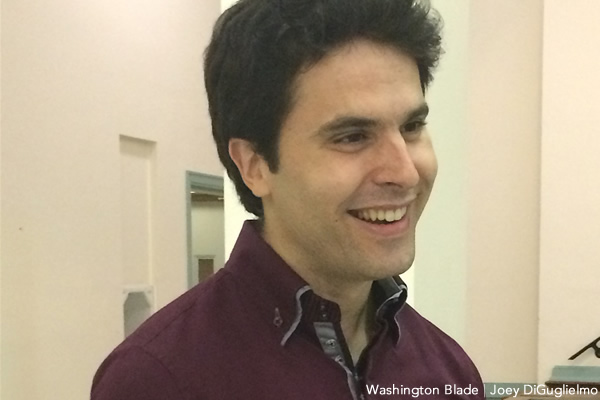
Raul Prieto Ramirez greets fans at a reception following his organ recital on June 18 at First Baptist Church. (Washington Blade photo by Joey DiGuglielmo)
First Baptist Church of Washington, a large, LGBT-affirming house of worship just off Scott Circle, continued its Virtuoso Organist Series last weekend with another performer who truly lived up to the series’ name — Raul Prieto Ramirez, probably the best-known Spanish organist on the international scene today.
The afternoon was yet another perfect pairing of masterful musician with truly great instrument at his disposal — in this case, First Baptist’s mighty 118-rank double Austin organ, installed in 2013. Ramirez easily joined the ranks of other great performers who’ve played there in recent years such as Diane Bish, Ken Cowan and Hector Olivera. It’s a true treat to hear these world-famous virtuosos play what is arguably the finest organ in Washington and Ramirez was yet another home run for the series, masterfully managed by D.C. musical legend Lon Schreiber, organist and choirmaster at First Baptist. Sadly, attendance was not great (about 70), no doubt because it was Father’s Day.
Opening with Bach, Ramirez, making his D.C. concert debut, played the “Prelude and Fugue in D Major (BWV 532)” cleanly and efficiently. He registered the pieces much more conservatively than I’ve heard him register Bach previously, but that was fine.
A lengthy musical journey followed with “Triptico del Buen Pastor (Triptych of the Good Shepherd),” by Jesus Guridi that gave Ramirez lots of opportunity for tone painting as he played through the three selections, whose titles translate to “the flock,” “the lost sheep” and “the good shepherd.” Based on a biblical notion, Ramirez’s registration variations were the most interesting facet of the triptych moving from flute-heavy pastorale passages, principal-heavy transitionary passages with lots of dynamic contrast and character evocation, a stately chorale-like climax and a somewhat jarring finale.
Sometimes organ recitals are too wacky, as if the concert organist wants too badly to eschew anything (Bach notwithstanding) that suggests church repertoire. That’s all fine — there are no rules — but it was nice to hear a stately piece like this with long passages that sounded like something regal you might hear during a religious service. I didn’t love the piece, but it was nice to hear the organ in this mode.
A Bach chorale (“Liebster Jesu, wir sind hier”) served as a palate cleanser, then Ramirez closed the first half with a showy, bombastic rendition of “Allegro,” the first movement from Widor’s “Symphony VI (Op. 42, No. 2).” Ramirez, in perfectly fluent, albeit heavily (but endearingly!) accented English, provided charming and insightful commentary throughout the afternoon. His personality is almost as much a part of the show as the actual playing. You left feeling you’d gotten to know him a little and it was good company.
The second half followed suit in big-mellow-big fashion with a satisfying triple whammy of Liszt’s “Mephisto Waltz, No. 1,” two short pieces by Italian composer Joan Bautista Cabanilles and Ramirez’s own transcription of Wagner’s “Prelude to Die Meistersinger von Nurnberg.” Ramirez clearly had fun creatively registering all the selections. The second half, especially, made judicious and effective use of the organ’s two Trompette-en-Chamade ranks, blending these stately fanfare trumpet stops convincingly with the rest of the organ thunder. That’s harder to do than you’d think. He played entirely from memory.
Three encores followed and oddly provided some of the most musically satisfying moments of the entire recital. The first was a short but flashy pedal piece often erroneously attributed to Bach; the second and third were authentic Bach pieces, the latter of which gave us some of the best moments to hear the organ’s soft flute stops, undergirded with deep, spongy 16-foot flutes in the pedal organ. It was an odd way to end a recital — most people like to go out with more of a bang — but it worked.
Ramirez, who teaches at Indiana’s Ball State University when he’s not traveling, is an organist of profound ability and remarkable insight who has deep understanding of what works, why it works, how to register and pace a wildly eclectic program and how to whittle down vast resources into something cohesive, as playing an organ this large is almost like preparing a meal that makes sense with endless spices at your disposal.
It all coalesced into something a little daring, a little unexpected, at times warmly familiar, never arbitrary and, by the end, quite satisfying. With Ramirez, you never feel he’s opening every can of paint just because he can. Even the most virtuosic passages — and there were many — never felt show-offy. Musicality trumps technique in his ethos. The ear seems to take in his playing with ease because you sense early on that musically you can trust him. You’re in capable hands. He knows where he’s heading with all this and you feel much like you do watching a good Scorsese film. He’s that kind of auteur and it was that kind of afternoon.
Music & Concerts
Washington chorale kicks off Christmas with vibrant program
‘Thine Own Sweet Light’ concerts planned

The full Washington Master Chorale will return for its annual holiday concert tradition with “Thine Own Sweet Light” on Friday, Dec. 19 and Sunday, Dec. 21 at St. Ann’s Catholic Church (D.C.) and Church of the Epiphany (D.C.).
The concert will feature the rich sounds of the 50-voice, a cappella chorus performing lush, seasonal choral music inspired by the theme of light. Highlights include Edvard Grieg’s “Ave Maris Stella,” Eric Whitacre’s “Lux Aurumque,” and Christopher Hoh’s “Holy, Holy, Holy is the Lord God of Hosts.” The program will also present a new work by Barcelona composer Josep Ollé i Sabaté, along with charming holiday folk songs and seasonal favorites.
For more details, visit the Washington Master Chorale website.
Music & Concerts
Queer mega stars (and allies) ready to take D.C. stages this fall
Watch LGBTQ icons light up stages across the DMV as they sing, dance, and drag their way through spectacular shows.

One of the best ways to welcome fall is by catching LGBTQ performers (and their allies) lighting up some of the D.C. area’s biggest stages. From country and pop to drag and rock, the season is packed with shows you won’t want to miss.
Maren Morris – The country, rock, and pop diva—known for hits like “The Bones” and for standing up against Nashville’s anti-LGBTQ voices—takes the stage at Wolf Trap (1551 Trap Rd, Vienna, Va.) on Friday, Sept. 12 at 8 p.m. Tickets start at $64.
RuPaul – The mother of modern drag and host of “RuPaul’s Drag Race” will spin a DJ set at Echostage (2135 Queens Chapel Rd NE) in Northeast D.C. on Sept. 20. Before RuPaul swaps wigs for headphones, Trade and Number 9 owner Ed Bailey will warm up the decks. For tickets and details visit echostage.com.
Conan Gray – The queer pop prince, celebrated for his Gen Z anthems like “Heather” and “Maniac,” brings his Wishbone Pajama Show to EagleBank Arena in Fairfax, VA, (4500 Patriot Cir) on Sept. 20 at 8 p.m. Tickets start at $113. For more info visit shop.conangray.com/pages/tour.
All Things Go Music Festival – With a lineup that includes Noah Kahan, Lucy Dacus, Kesha, Clairo, Doechii, and more, the beloved LGBTQ-friendly festival takes over Merriweather Post Pavilion (10475 Little Patuxent Pkwy, Columbia, Md.) Sept. 26–28. For tickets and details visit allthingsgofestival.com.
BERTHA: Grateful Drag – This unique tribute brings drag artistry and the sounds of the Grateful Dead to The Atlantis (2047 9th St NW) on Sept. 27. Tickets start at $47 at theatlantis.com.
Peach PRC – Rising Australian pop star and out lesbian, whose confessional tracks like “Perfect for You” and “Forever Drunk” have made her a queer TikTok darling, performs at The Atlantis on Sept. 29 at 6:30 p.m. The show is general admission only. Additional details are on theatlantis.com.
Addison Rae – The TikTok star-turned-pop princess, who’s crossed over into music with glossy hits like “Diet Pepsi” brings her sold out show to The Anthem (901 Wharf St., S.W.) on Sept. 30. Tickets are sold out, but resale options start around $80. For more info visit theanthemdc.com.
The Rocky Horror Picture Show 50th Anniversary – Celebrate the cult classic that’s been a queer midnight-movie staple for decades, with Barry Bostwick (a.k.a. Brad Majors) at the Warner Theatre (513 13th St., N.W.) on Oct. 2 at 8 p.m. Tickets start at $41 via Ticketmaster.
Chaka Khan, Patti LaBelle, Gladys Knight & Stephanie Mills – Four legends, one stage. Between Khan’s funk, LaBelle’s soul, Knight’s R&B, and Mills’ powerhouse vocals, this concert at Capital One Arena (601 F St NW) on Oct. 3 at 8 p.m. promises pure diva magic. Tickets start at $103. For more details visit capitalonearena.com.
Lorde – Joined by The Japanese House and Chanel Beads, the Grammy-winning New Zealand singer-songwriter behind “Royals” and “Solar Power” returns to The Anthem on Oct. 4 at 7 p.m. Lorde has long been embraced by queer fans for her dreamy pop and subversive lyrics. For more info visit theanthemdc.com.
Andy Bell (of Erasure) – The British queer rock icon, best known for synth-pop classics like “A Little Respect” and “Chains of Love,” brings his Ten Crowns Tour to the Lincoln Theatre (1215 U St., N.W.) on Friday, Oct. 17 at 8 p.m. Tickets are $90.45.
Doechii – The self-described queer “Swamp Princess”—and WorldPride 2025 headliner—continues her breakout year with the Live from the Swamp Tour at The Anthem on Oct. 21 at 8 p.m. Known for blending rap, R&B, and avant-garde performance art, Doechii is one to watch. Tickets start at $153.
Neon Trees – The out-and-proud Utah rockers behind “Everybody Talks” and “Animal” perform at the Lincoln Theatre on Friday, Oct. 24 at 8 p.m. Lead singer Tyler Glenn, who came out publicly in 2014, has become a strong queer voice in alternative rock. For tickets and info visit impconcerts.com.
Sasha Colby – The “RuPaul’s Drag Race” Season 15 winner strips down on the Stripped II Tour at the Warner Theatre on Nov. 2 at 8 p.m. Tickets available now on Ticketmaster.
Lola Young – The bisexual indie-pop sensation, whose raw songwriting has earned her millions of TikTok fans and multiple chart soaring hits visits The Anthem on Nov. 9 at 8 p.m. Tickets are still available.
Opera Lafayette
Featuring Mary Elizabeth Williams as Dido
+ Elijah McCormack, Chelsea Helm
Oct. 16, 7:30 p.m.
Sixth & I
PostClassical Ensemble
The Pale Blue Do: A Musical Voyage Inspired By Nature
Featuring National Geographic’s Enric Sala, Guest Curator
Wednesday, November 19, 7:30 p.m.
Terrace Theater
Washington Concert Opera
Starring Kate Lindsey, Theo Hoffman, John Moore, and Fran Daniel Laucerica
Nov. 23, 6 p.m.
Lisner Auditorium
Washington Master Chorale
An intimate a capella concert taking place in an architectural jewel, featuring cherished choral gems from Anglican and Catholic tradition and early American hymns. The concert will also present the world premiere of Christopher Hoh’s Holy, Holy, Holy is the Lord God of Hosts, and hymn singing featuring Robert Church, organist and choirmaster at St David’s.
Oct. 18, 7:30 p.m.
October 19, 5 p.m.
St. David’s Episcopal Church
Music & Concerts
Cyndi Lauper ready to have fun in Virginia
Superstar to bring final leg of farewell tour to Jiffy Lube Live
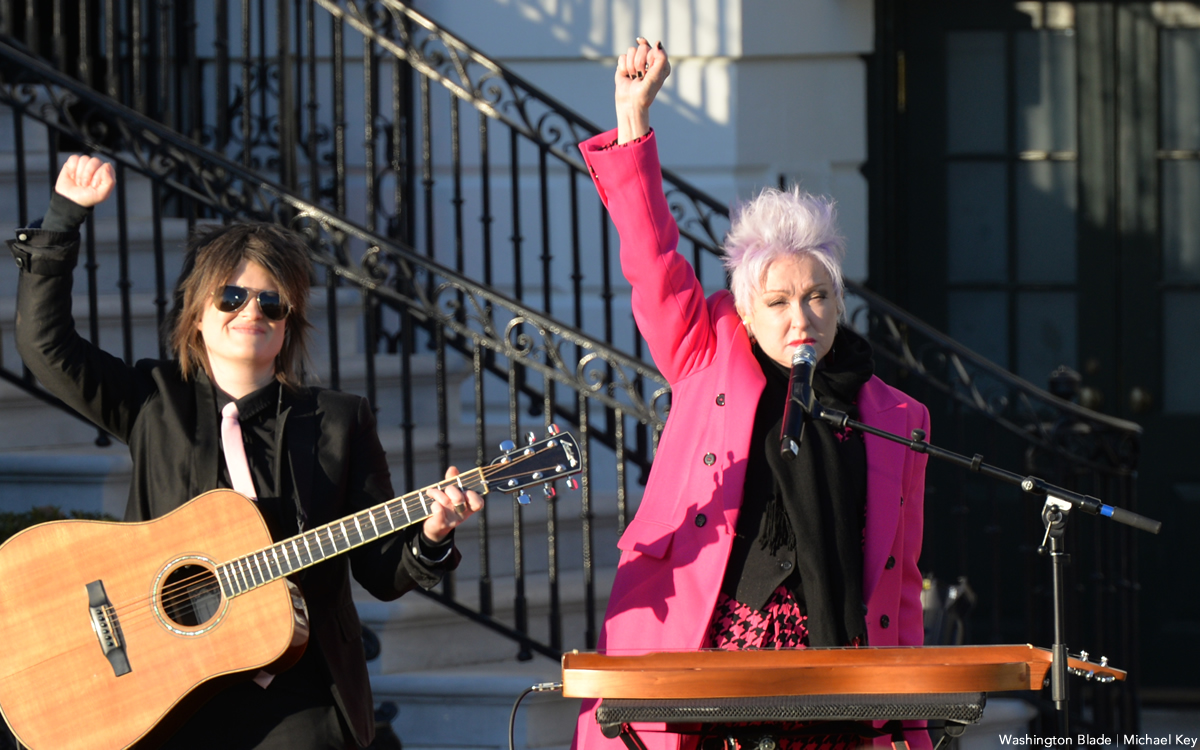
Superstar Cyndi Lauper will bring the final leg of her farewell tour “Girls Just Wanna Have Fun” to Bristow, Va., on Thursday, July 24 at Jiffy Lube Live.
Lauper’s international Farewell Tour – her first major headlining run in a decade – kicked off in North America last October, and included her first time ever headlining (and selling out) Madison Square Garden. Lauper’s performances have earned raves from the New York Times, Rolling Stone, Billboard, and many more, and surprise guests have included Chaka Khan, Sam Smith, and Hayley Williams. The tour just visited the U.K. and Europe, and will head to Australia and Japan in April.
Tickets are available on Live Nation’s website.


